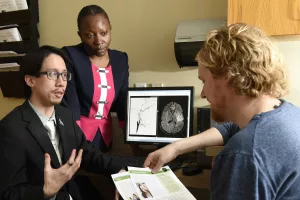We care for everything that affects the brain, spine and nerves. That includes problems like headaches, seizures, memory loss, tremors, numbness, trouble walking, vision changes and more. No matter what’s going on, we’ll listen, run the right tests and help you understand your next steps.
Heading in the right direction for brain, spine + nerve health
Neurology is all about understanding the brain, spine and nervous system. Problems can show up suddenly or develop over time, and they can be caused by injuries, infections, tumors, gene changes or other health factors. Some are common, like migraines or memory changes, and others are rare.
There are more than 600 neurological conditions, including Alzheimer’s disease, Parkinson’s disease, epilepsy, multiple sclerosis. These conditions can affect thinking, movement, speech, vision and sensation, but knowing what’s happening makes it easier to stay independent and keep doing the things you enjoy.
We use advanced testing and our specialist expertise to understand each condition. We work closely with primary care doctors and other specialists to see the full picture. Our focus is on helping people feel confident, stay active and continue living life on their terms.

Conditions
You can count on us to provide compassionate and supportive care for neurological conditions, including:
Testing
We use advanced tools and technology to find out what’s going on with your brain, spine and nerves. Some neurological problems can cause physical symptoms—like muscle weakness, pain or trouble with balance. Others may affect your mood or how you think and feel.
Our team looks closely at how your nervous system is working. We check your balance, reflexes, memory, coordination and more to see how your brain and body are connected. This helps us understand the full picture of your health.
Along with a physical exam, we may recommend tests such as:
- Blood tests
- Biopsies
- Carotid doppler ultrasound
- Cerebrospinal fluid analysis
- Computerized tomography angiography scan
- Computerized tomography (CT) scan
- Electroencephalograms (EEG)
- Electromyogram (EMG)
- Electroneurogram (ENG)
- Eye movement analysis
- Genetic testing
- Lumbar puncture (spinal tap)
- Magnetic resonance angiography (MRA)
- Magnetic resonance imaging (MRI)
- Muscle biopsy
- Nerve conduction studies
- Positron emission tomography scan (PET)
Treatments
While many neurologic disorders don’t have a cure yet, new treatments are helping repair and restore brain and nerve function. These advances can improve how you feel and help you live more independently.
Not everyone needs surgery. Treatment depends on how serious your condition is and what symptoms you have. We work with you to find the best options that fit your needs.
Some treatments we offer include:
- Clinical trials
- Deep brain stimulation
- Medications
- Neurorehabilitation
- Occupational therapy
- Physical therapy



From regular office visits to inpatient stays, find the healthcare you need and deserve close to home.

Meet the doctors and care team devoted to supporting you every step of the way along your path to better health.